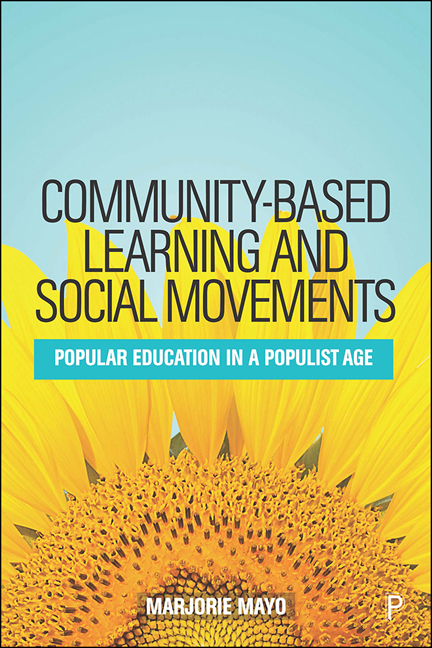Book contents
- Frontmatter
- Dedication
- Contents
- List of Figures
- Acknowledgements
- 1 Popular Education in a Populist Age
- 2 Popular Education and its Roots
- 3 Spaces and Places for Popular Education and Participatory Action Research
- 4 Principles and Practice
- 5 Sharing Understandings of Varying Histories and Cultures
- 6 Making Connections: Linking Issues and Struggles Across Space and Time
- 7 Power and Power Analysis
- 8 Community–University Partnerships
- 9 Taking Emotions into Account
- 10 Looking Backwards, looking Forwards
- References
- Index
7 - Power and Power Analysis
Published online by Cambridge University Press: 10 March 2021
- Frontmatter
- Dedication
- Contents
- List of Figures
- Acknowledgements
- 1 Popular Education in a Populist Age
- 2 Popular Education and its Roots
- 3 Spaces and Places for Popular Education and Participatory Action Research
- 4 Principles and Practice
- 5 Sharing Understandings of Varying Histories and Cultures
- 6 Making Connections: Linking Issues and Struggles Across Space and Time
- 7 Power and Power Analysis
- 8 Community–University Partnerships
- 9 Taking Emotions into Account
- 10 Looking Backwards, looking Forwards
- References
- Index
Summary
The previous chapter concluded with a focus on the development of support networks, linking popular educators together to pool ideas, identifying ways of sharing resources. This chapter moves on to focus on ways to identify potential allies, along with ways of identifying potential opponents. Who has the power and influence to make a difference, whether positively or negatively, depending on the issues and interests concerned? Who might be won over, depending on their own interests and views? And how can popular educators facilitate such analyses of power and influence in specific contexts?
The first part of this chapter summarises different approaches to the notions of power, authority and influence as these have been understood from varying perspectives, over time. This sets the framework for the discussion of power analysis tools, more specifically, with examples of how these have been applied in popular education contexts. Having focused on power analysis, taking account of the different and often competing interests and structural inequalities that communities need to address, the chapter concludes by focusing on power and power analysis within communities and groups themselves. This final aspect includes some discussion of the powers associated with leadership (whether formal or informal) as well as the negative powers that people can exert, whether consciously or unconsciously, undermining others, preventing their voices from being effectively heard. Subsequent chapters explore the issues for popular educators, more specifically, including the challenges involved in working with people's emotions (the focus of Chapter 9).
Power, legitimacy and influence
The Local Trust's report on The Future for Communities: Perspectives on Power described a powerful community as ‘one where people feel they belong and where everyone can contribute’ (The Local Trust, 2018: 32). People would be able to debate their differences in safe spaces where difficult conversations could take place. But people would also need to share understandings of how power works, the report continued, ‘how to evaluate the information they are given and to find out how to navigate complex and often opaque power systems’ (2018: 49). And they would need to recognise that change also needed to come from beyond the community. Power holders ‘in the public sector and business – need the will and the skills to work effectively with local communities’ (2018: 47).
- Type
- Chapter
- Information
- Community-based Learning and Social MovementsPopular Education in a Populist Age, pp. 117 - 136Publisher: Bristol University PressPrint publication year: 2020



